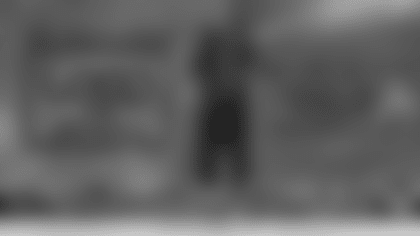Caldwell Discussed First Week on Job With Colts.com
INDIANAPOLIS – He knew he was prepared as possible for the situation.
But in another sense, Jim Caldwell figured you couldn't be completely prepared – not emotionally, anyway – for what he faced early this past week.
A man you admire as much as any with whom you've ever worked is saying goodbye one minute . . .
You're realizing a dream the next . . .
And the next, you're realizing that you must be a leader – now . . .
Caldwell, a Colts assistant the past seven seasons, on Monday became the Colts' 17th head coach, a position held by Tony Dungy the past seven seasons. Caldwell said this week he had anticipated the situation and that at times during the past year – really, for much of his adult life – he had considered, dreamed and planned how he would handle such a scenario.
Then, came Monday. And suddenly, it was real.
It was, Caldwell said, an emotional time.
It was a memorable time.
Mainly, he said, it was as strange a time as he could imagine.
"It really was," Caldwell, who turned 54 Friday, four days after becoming a head coach after 25 years as a college assistant and head coach and seven more as an NFL assistant.
"If you think about, very rarely in your life do you ever have a situation in which you're grieving because you've lost a dear friend, a mentor, a confidant and also somebody that you respected to an unbelievable level who had a great impact on your life. You've been with them for eight years, and all of a sudden, there's going to be an absence. That's an emotional time in your life.
"Then, at the same time, you've reached the pinnacle of your profession. You're excited, you're fired up at the opunity, you're ready to implement your plan . . . I heard Tony mention it was kind of bittersweet. That's a good way to describe it. It was maybe the happiest day of my life, and there were moments when it was an extremely sad day as well."
Caldwell said he learned of Dungy's decision on Sunday around 5:10 p.m., shortly after Dungy spoke with Colts Owner and Chief Executive Officer Jim Irsay and Colts President Bill Polian.
"At nine o'clock the next morning, we go into the staff room and he (Dungy) tells the staff," Caldwell said. "He walks and he hugs every guy in the room. There's an exchange, obviously, of emotions, and he says, 'Next Man Up.' I slide into the chair that he has occupied for the last seven years and I begin to conduct business."
Caldwell said he contained his emotions at the moment.
But he said that was possible for just one reason.
"I had a little bit more time than most of the guys in the room, because I knew earlier," he said. "I had gotten through that initial shock. At that point, I was looking at my role in terms of leading these men and I was focusing on that at that point in time."
What follows is the rest of Caldwell's interview this week with Colts.com:
Question: How prepared did you feel this week upon taking over as head coach?
Answer: The fortunate thing about this whole situation was that last year at this time, I knew there was a possibility of it happening even then. I really had started to prepare even three years prior to that, because I did a lot of interviews with different pro teams. Typically, you take over a franchise this time of the year. I had to think about exactly what I would do from that point on. I put together what I called my first 30 days. What it enabled me to do was put together a plan of, 'What would I do if I walked into a situation if I knew little about other than what I had done for my study and preparation and those kinds of things? What would I do to familiarize myself with the organization?' So, I have this real detailed layout of what I do for those first 30 days. It is applicable to what's happening to me right now.
Q: How so?
A: Although I've been here for seven years, my role was different. I looked at things a lot different. My scope was a lot a bit narrower. Now, I look at things from an overall – more of a corporate – sense. The preparation has helped me in that way.
Q: One big part of your week has been dealing the media for the first time as an NFL head coach . . .
A: It's nothing that I haven't done before. I went through the same thing when I was at Wake Forest. It was a novelty, because I was the first African-American coach in the ACC in football. There was a lot of national coverage of that, so it made somewhat of a splash. Those weeks when I was at Wake Forest were somewhat similar to what I'm doing now, (smiling) but it's not quite like this. This is a special, special time when you have an opportunity to coach at the pinnacle of your profession. That's special.
Q: You say you have a 30-day plan. What do you want to accomplish?
A: One of the things I go through is certainly to familiarize myself with all of the people that we work with. Oftentimes they have no idea who you are and what you're all about. You have to establish, more or less, the direction you want to go and how you want things handled. They have to get a sense of you. You can't always get them all together at one time. Also, sometimes the talk and the direction is tailored toward a particular group. You have to be able to get to them. I've actually been walking around the building. I met with the guys in strength and conditioning. I had an opportunity to go in with (Equipment Manager) Jon (Scott) and (Assistant Equipment Manager) Sean (Sullivan) and those guys and meet with them briefly – the same thing in terms of our medical staff. I also met with all of our assistant coaches earlier in the week, because the same thing happens there. They know you, but they don't know you in terms of this role. They have been around you a lot, and certainly they have a sense of your character and all of those things. The vantage point changes a little, so that was something I needed to do. The other thing is dealing with the players. That's an important part, familiarizing yourself with, 'Who are the free agents? Who are the unrestricted free agents – being able to contact them and let them know how they fit into your plan.' I don't have to do that part around here, because it's already handled. I know the players. I have a good sense of them. Some of my work is probably not quite as hectic as it would have been.
Q: Do you have in mind areas that need the most attention at this point?
A: That's the great thing about is, is the fact that I have a pretty good sense of maybe some areas that we need to try to get corrected. Being a head coach, just in terms of what you're trying to get accomplished, is not a whole lot different than being an assistant coach. As an assistant coach, when you're in the offseason, you take a real good look at your position and you try to look at where you performed well and where you performed poorly. Once you identify that, then you have to come up with ways on how you're going to improve that. Then, you have to start to enact things – put your plan together, let's go after it and see if we can get that gone – because that's what our job is based on. The same thing happens as a head coach. There might be some overall phase that you didn't perform as well in – some phase of the kicking game, or some phase of offense or defense. What you have to do is identify the problem. They say the first phase of correcting a problem is first you have to acknowledge that there is indeed a problem. From that point, you have to put together a plan and try to attack it.
Q: Some people would say, 'Twelve victories and seven consecutive playoff appearances – keep doing what you're doing,' but it's not that simple.
A: No, it's not, particularly because of the fact that the way our league is set up, there are no bowl games at the end of the year, where you can have a great year and go to a bowl game and win it and that's it: everybody's happy. There is only one team at the end of the year in this league, so the goal is to get to the Super Bowl and win it. We fell short of that, so that's what we're looking at – ways to get us in a position where we can knock on that door another time.
Q: You mentioned earlier the process of establishing your relationship with the coaching staff. That has to be an interesting process, considering the coaches were peers before and now you're the boss . . .
A: I think it all depends how you've dealt with your colleagues up that point. I think it's a long process. If you've dealt with them with integrity, if they have respect for you, if they feel you have been able to do a good job at your craft and it's demonstrated consistently, if they feel you work hard, you care about what you're doing, you have pride in your work and some humility added to it, it's not as hard as you think. I went through a transition where I went from being a player in college (at Iowa) to a graduate assistant on the same team. If you think about that, it's the same dynamic for the most part, so the next year, I'm coaching the guys I actually played with. I found that to be a similar sort of progression, so hopefully, if you're doing the things you're supposed to do as an assistant coach, that if the opportunity does come about, it shouldn't be as much of a transition, because you're still dealing with them in an honest and open manner and you haven't changed.
Q: Shortly after you were named associate head coach last January, you did several interviews. In each, you were very clear about your role in how it related Tony Dungy, who was still the head coach. Can you talk about how you approached that time?
A: I've always been one that understood protocol. I can describe it to you this way. There's a central core of authority. At that particularly point in time, I was not in that core. That's (Colts Owner and Chief Executive Officer) Jim Irsay, (Colts President) Bill (Polian) and Tony in terms of the decision-making process. My role was as an observer. My role was as an understudy. My role was one in preparation for one day having an opportunity to enter that circle. I think where you get into problems is when you overstep your bounds. I have been, certainly, a person in a position of authority and know what that does in terms of undermining the entire idea of leadership, so I've always been very, very conscious of that. You also have to have a person like Tony who is fearless in terms of being transparent and opening up. He was very gracious with me. He allowed me to ask questions. He completely disarms you in that sense. Because of the fact that he's so smart, he does not back away from engaging people. He's not defensive at all. That made my position even easier.
Q: You had the opportunity to observe for a year. You've discussed it a bit this week, but in what way was that the most helpful? How valuable was that?
A: What was interesting was one day we were in a draft meeting. We were all in there together – Bill, (Senior Consultant to Player Personnel) Dom Anile, (Vice President of Football Operations) Chris (Polian) and Tom Telesco. It might have been our first meeting. He (Dungy) walked in and said, 'Man, you know what Jim? I wish I had had a chance to do what you're doing right now. I had to go in and make some mistakes, and feel my way. You have a chance to sit and listen and watch and understand how things are done.' Even right now, a lot of things that would probably make you a little bit more nervous, I know simply because of the fact that they were gracious enough to give me a chance to become more educated in those situation. That has been a lot of help.
Q: How long have you been consciously preparing to be an NFL head coach?
A: It would have to go back a ways. I can tell you how I kind of attacked everything in my profession early on. When I first started coaching, my first fulltime job was at Southern Illinois University in Carbondale, Ill. I was on the job for about three months. At that point in time, I said, 'You know what?' I want to be a head football coach in Division I. So, for 16 years, I prepared. Every night, after I finished my work at night, I would sit in my office and think about the day. I took notes on the day. I put them in a little book. I started my notebook file – three-hole punch and stick it in there. What it would be was observation. I'd have notes on a team meeting when coach (Rey) Dempsey has spoken, and what he had said. I would write in the margin, 'I would have said it this way,' or, 'I like this,' and highlight it. If we put in a new play, or a new defense, or a new stunt, if I liked it, I'd put it in my book and incorporate it. 'I may not call it this particularly name. I like this name.' I would write down what little adjustments I would make. I did everything that way. I reflected. I did it from a recruiting standpoint: how I would handle the recruiting weekend, or how we would organize it, what would be really important, what message you were trying to get across, what little things I do personally with my recruits where I would say, 'That's probably something I would mandate to the staff.' I would look for other ideas, exploring, talking to different coaches on the road and asking them about different situations, finding out how they handled them. I did that in every single phase for 16 years to an unbelievable level that probably most people don't understand. During the season, I would take an area that maybe people weren't that familiar with. Let's say red-zone defense or goal-line defense. The first thing I would do is I would research that particular area and find out who did it best in the country. Then, I would begin to study their film. I would call them and say, 'Hey, can you send me some of your film,' or I'd call one of their opponents and get the film. I'd talk about it. I'd get it in my spirit and then I would put a package together: 'These are my thoughts on it. This is my philosophy. These are the things I want to do. I want to talk about what kind of stunts I want to do. Would it be heavy run, so forth.' Then, I would take that same thing and call high schools. I'd say, 'Do you guys have a clinic going on in that area? I'm coming up to do a little recruiting. I'll clinic some of your coaches.' Then, I would go in and I'd clinic on that red-zone defense. By that time, I had studied, gotten a good feel for it, put together my film on it and then I'd go in and I'd teach it. Every year, I'd do a different area. I'd do it on both sides of the ball, because I coached on defense and I coached on offense. In my 16th year, when I got my head coaching job at Wake Forest, I had my offensive playbook together, defensive playbook, recruiting philosophy. I knew how much my staff was going to cost me. I already had my staff in place and had talked to them. I never thought about being a head coach in the National Football League until I entered the National Football League. But the moment I entered, I started looking at how best to prepare myself and I had the best guy in the land to emulate. That was Tony when I started at Tampa Bay.
Q: In terms of setting your tone, how crucial are these first few weeks?
A: You don't get a chance to waltz into it. It's here and now. (Laughing) This is a right-now business, so you better be ready.
Q: And there will be crucial points like that for the next several months . . .
A: There will be. It may have been Ross Perot who made this statement and (Penn State Football) Coach (Joe) Paterno would always kind of echo it. He said, 'Everything is on the razor's edge, and you're kind of battling and fighting every single day to keep it on course.' That's what leadership is all about. I think every single day you're challenged in a variety of areas. You have to be able to stand up to those tests and be yourself and be consistent.














